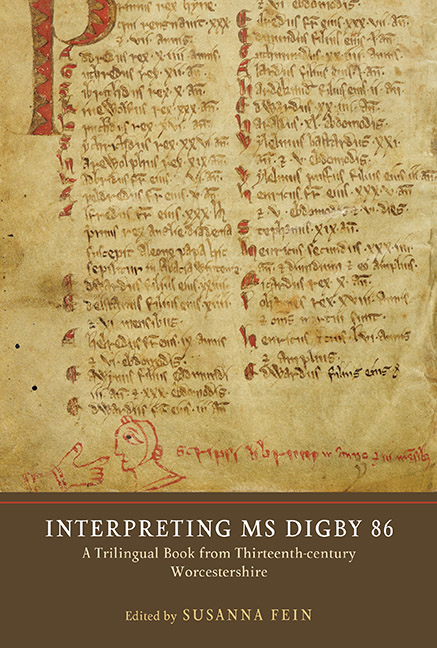Book contents
- Frontmatter
- Contents
- List of Illustrations
- List of Contributors
- Acknowledgements
- Abbreviations
- Digital Facsimiles of Frequently Cited Manuscripts
- The Contents of Oxford, Bodleian Library, Digby 86
- Note on the Presentation of MS Digby 86 Texts
- Introduction
- 1 Fellow Travellers with Saint Nicholas
- 2 Anglo-Norman Religious Instruction in MS Digby 86: Echoes of Lateran IV
- 3 Latin and Vernacular Prayers in MS Digby 86
- 4 Science, Medicine, Prognostication: MS Digby 86 as a Household Almanac
- 5 Literary Therapeutics: Experimental Knowledge in MS Digby 86
- 6 Petrus Alfonsi, the Disciplina clericalis and Le Romaunz Peres Aunfour of MS Digby 86
- 7 Misogyny in MS Digby
- 8 Gender Trouble? Fabliau and Debate in MS Digby 86
- 9 The Middle English Poetry of MS Digby 86
- 10 MS Digby 86 and Thirteenth-Century Scribal Poetics
- 11 The Scarlet Letter: Experimentation, Design and Copying Practice in the Coloured Capitals of MS Digby 86
- 12 Below Malvern: MS Digby 86, the Grimhills and the Underhills in their Regional and Social Context
- Bibliography
- Index of Manuscripts Cited
- General Index
- Manuscript Culture in the British Isles
Introduction
Published online by Cambridge University Press: 24 October 2019
- Frontmatter
- Contents
- List of Illustrations
- List of Contributors
- Acknowledgements
- Abbreviations
- Digital Facsimiles of Frequently Cited Manuscripts
- The Contents of Oxford, Bodleian Library, Digby 86
- Note on the Presentation of MS Digby 86 Texts
- Introduction
- 1 Fellow Travellers with Saint Nicholas
- 2 Anglo-Norman Religious Instruction in MS Digby 86: Echoes of Lateran IV
- 3 Latin and Vernacular Prayers in MS Digby 86
- 4 Science, Medicine, Prognostication: MS Digby 86 as a Household Almanac
- 5 Literary Therapeutics: Experimental Knowledge in MS Digby 86
- 6 Petrus Alfonsi, the Disciplina clericalis and Le Romaunz Peres Aunfour of MS Digby 86
- 7 Misogyny in MS Digby
- 8 Gender Trouble? Fabliau and Debate in MS Digby 86
- 9 The Middle English Poetry of MS Digby 86
- 10 MS Digby 86 and Thirteenth-Century Scribal Poetics
- 11 The Scarlet Letter: Experimentation, Design and Copying Practice in the Coloured Capitals of MS Digby 86
- 12 Below Malvern: MS Digby 86, the Grimhills and the Underhills in their Regional and Social Context
- Bibliography
- Index of Manuscripts Cited
- General Index
- Manuscript Culture in the British Isles
Summary
THE scribe of Oxford, BodL, MS Digby 86 sometimes expressed himself in pictures as well as in whatever French, English and Latin works he selected for new combinations and purposes in his idiosyncratic making of a household book. The result of his overall effort across 207 folios is a medieval manuscript utterly singular in its ‘extravagantly heterogeneous’ nature. In it, his occasional drawings are frequently labelled with tags, almost as if they are designed for pedagogy in reading Latin: ‘femina’ (woman) beside a woman's head with free-flowing locks (fol. 80r), ‘homo’ (man) beside a man's head in a pointed hood (fol. 79v), ‘bibo’ (I drink) beside a similarly hooded man sipping from a goblet (fol. 34v), ‘ipocras’ (Hippocrates) beside the head of a bearded man of wise countenance (fol. 8v) – this last example being an author-portrait designed to accompany the medical treatise Letter of Hippocrates.
In the bottom margin of fol. 205v, the last folio of the scribe's original book, the scribe signs off his large production with a self-portrait, another cartoonishly sketched head, now in a close-fitted hood, with a manicule pointing at this head as if to say ‘look, it's me’, and with an inscription: ‘scripsi librum in anno et iii mensibus’ (I wrote the book in a year and three months). According to one scholar, this inscription ‘surely’ displays ‘an amateur's expression of pride in having completed a long and arduous task which would doubtless have been accomplished much more quickly by a professional’. This statement typifies how the Digby scribe has been viewed as something of an amateur at scrivening even though his hand bears likeness to that of other scribes from the period. By all indications, however, what was most new for him was the activity of making an anthology, and in many of matters of codicology and design his novice skills show.
And yet the final product is one of the most important miscellanies to survive from medieval England – a trilingual marvel of a compilation, with quirky combinations of content that range from religion, to science, to literature of a decidedly secular cast.
- Type
- Chapter
- Information
- Interpreting MS Digby 86A Trilingual Book from Thirteenth-Century Worcestershire, pp. 1 - 9Publisher: Boydell & BrewerPrint publication year: 2019

